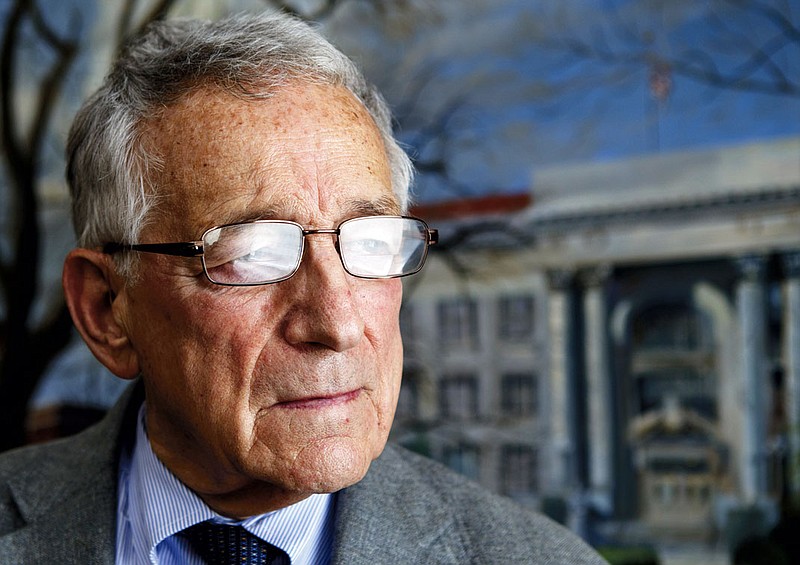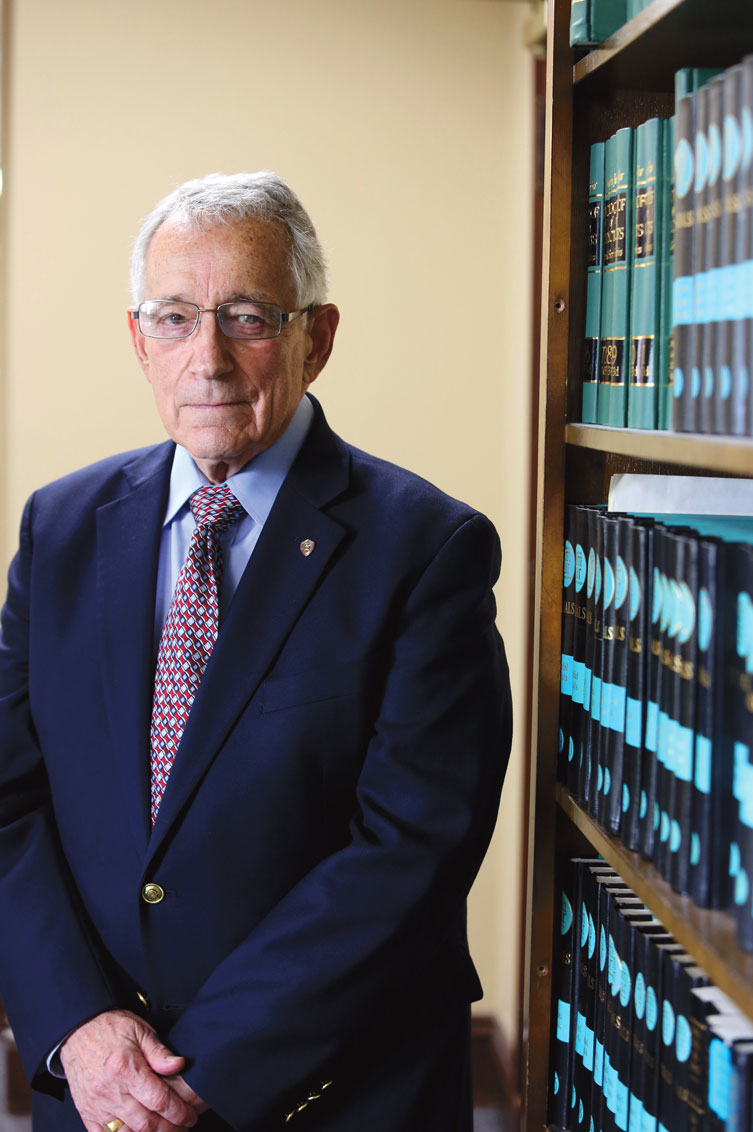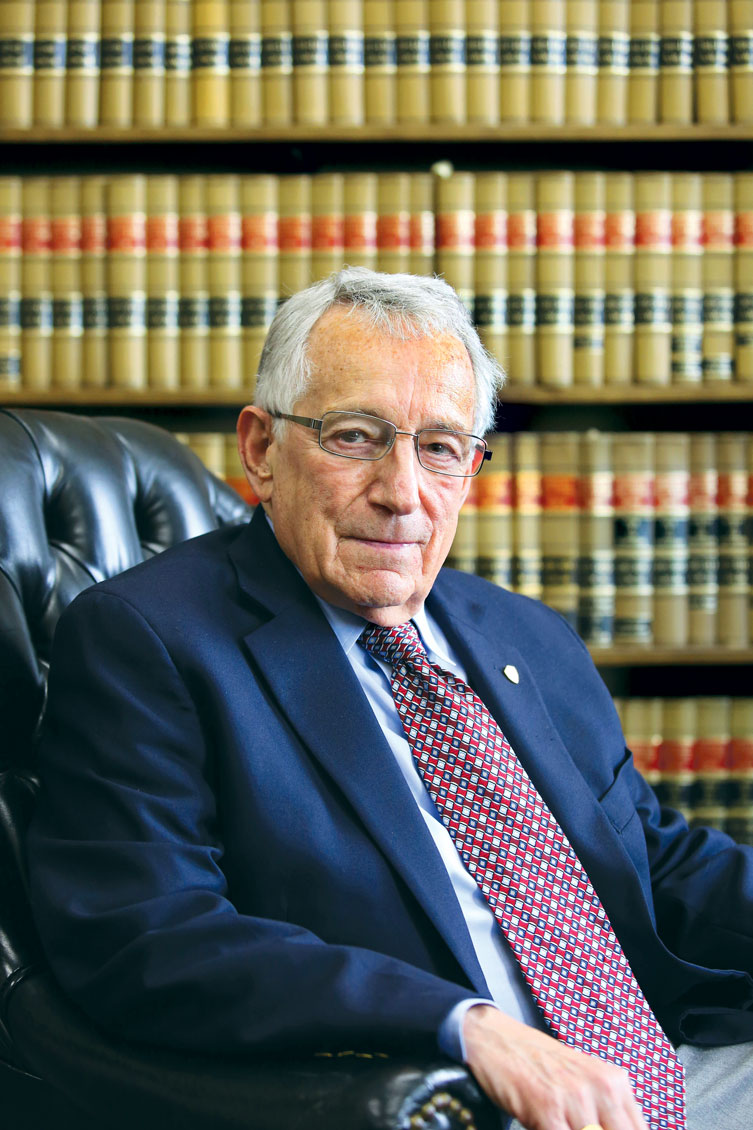Jerry Summers is one of a handful of Chattanooga attorneys whose name recognition comes by reputation, not TV commercials.
Practicing law since 1966 and in private practice since 1969, Summers has distinguished himself in and out of the courtroom, earning accolades from his peers, his clients and from the people who know of his quiet philanthropy. He has prevailed in multiple high-profile lawsuits over the years and argued civil and criminal cases before the U.S. and Tennessee Supreme courts.
In conversation, though, he generally shrugs off the awards and accomplishments.
"I had someone tell me, 'You've had more appellate decisions than anybody in the state,' and I told him, 'That's because I lose a lot,'" he chuckles.
There have been losses, of course, over 50-plus years, but losses lay the foundation for the appeals process. More than once, Summers' tenacity has brought about precedent-setting decisions from the higher courts.
"There's a lot more talented lawyers than I am," he says. "But I've been lucky. I got good breaks and good cases."
At age 78, he is still active in the profession, though most of the cases that come to his firm, Summers, Rufolo & Rodgers, are handled by one of the other partners or associates in the office. "Unless they specifically ask for me," says Summers, who specializes in criminal defense, personal injury, workers compensation and asbestos and mesothelioma cases.
Instead of courtroom cases, for the last two years Summers has turned his focus to a crusade against what he calls "deceptive lawyer advertising." He delivers his message via a blog, www.truthinlawyeradvertising.com, that has earned him the ire of a handful of colleagues who zealously embrace self-promotion in local media.
The dissension has resulted in the blog being banned from dissemination to members of the Tennessee Trial Lawyers Association. "They blackballed me after some of the Chattanooga attorneys complained," he says.
Just as he does with praise, Summers seems to shrug off the discord, too. He posts to the blog regularly and even nicknamed it the "Silly Blog," adopting the dismissive term given it by a couple of attorneys who heavily advertise and take exception to his cause.
Summers is not dissuaded, referencing the principle he uses as the motto of his law firm and the force that guides his life's work: "I still believe the practice of law should be a profession, not a business," he says.
WHY NOT LAW?
For anyone familiar with his storied career, it might come as a surprise that, growing up, Summers never aspired to practice law. Nor did he even chart that career path in college. Law school simply became the most viable option when three other possibilities fell through.
In a 2014 book thanking the people who have aided and abetted his life's journey, Summers admits he was not a stellar student.
But he did love sports. He played three well - football, basketball and baseball - at Central High School (then on Dodds Avenue), and played baseball well enough to earn a scholarship to Auburn University in Alabama. After his first year, he transferred to the University of the South in Sewanee, Tennessee. He graduated from Sewanee with a degree in economics, "which has never helped me in the practice of law," he says. With four years of college behind him, he was facing four possible career opportunities.
His uncle Jimmy L. Smith, a used-car salesman with deep - and, Summers says, sometimes questionable - connections in the community took him to meet with his lawyer, John K. Morgan, who helped the young Summers evaluate each choice.
Option 1: A scout for the New York Mets had offered Summers a $500 per month minor-league baseball contract after he had been selected an All-Conference catcher at the College Athletic Conference Spring Tournament at Washington and Lee University in Lexington, Virginia.
He and Morgan agreed that chronic shoulder problems from a high school football injury might thwart his budding baseball career.
Option 2: Summers had inquired about joining the Air Force as a fighter pilot, having long held a fascination with flying.
This was in 1963, and with the Vietnam conflict accelerating, Morgan counseled that this might not be the best choice. (Summers says he was later rejected by the military because of the football injury.)
Option 3: A vice president at Volunteer Life Insurance Co. had offered Summers and a Sewanee classmate jobs with the company with a starting salary of $500 a month. "It seemed pretty lucrative at the time," Summers recalls.
But Morgan explained that the company's leadership hierarchy was weighted with family members who could forestall Summers' rise through the ranks.
Option 4: Finally, Summers told Morgan he had just won one of seven freshman scholarships to the University of Tennessee College of Law in Knoxville. Summers attributes the $1,500 scholarship to the strength of his Sewanee degree rather than any academic achievement on his part.
Attorney Morgan recommended law school for his new acquaintance. "I had eliminated the other choices," Summers says, "so I said why not."
He lost the scholarship to poor grades his first year, but he persevered, working seven jobs at times in his college career to pay his way through school.
HIGH-PROFILE CASES
Summers' first job out of law school was as a prosecutor in the district attorney's office in Chattanooga. He worked there two and a half years before deciding that his heart lay elsewhere. "I'm always for the underdog," he says. He entered private practice in 1969.
Over the years, Summers has represented some of Hamilton County's most notorious citizens, including people charged with capital murder. He has had a knack for introducing reasonable doubt into what might have been considered an open-and-shut case. The result has been sometimes surprising triumphs in court.
He likes telling the story of a visiting attorney who asked a cab driver if he had heard of Jerry Summers.
"Oh, yeah," the cab driver told the attorney, Summers relates. "He's the guy you get when you're really guilty."
Summers is amused by the anecdote, but it illustrates his basic belief in his professional obligation. "Everyone is entitled to a fair trial," he says.
Hamilton County Criminal Court Judge Tom Greenholtz describes his mentor and former boss as "tenacious and fierce" in the courtroom. But there's a stateliness about Summers that does not allow for being underhanded or impolite.
"He's still one of the lions of the bar," Greenholtz says. "He still sees the law as a profession."
Greenholtz says even adversaries would have to concede Summers' deep knowledge of jurisprudence. Summers says he devotes himself to the study of law, and its ever-changing nature, to make up for his early academic shortcomings.
His cases have led him twice to the U.S. Supreme Court. The first visit, in 1973, resulted in the Supreme Court overturning a Tennessee law requiring a defendant to be the first witness if he intends to testify in his own defense. Records show that he lost the case before the trial judge, before the Court of Appeals (3-0), and before the Tennessee Supreme Court (5-0), but his argument was persuasive before all nine Supreme Court justices.
More recently, other high-profile cases have put his name in the news. In an interview, he doesn't identify the clients, strictly adhering to attorney-client privilege even though names and decisions have been widely reported.
In 2018, a Chattanooga man's drunken driving conviction was dismissed after the Tennessee Court of Criminal Appeals ruled that a roadblock that led to his arrest was unconstitutional. Summers and fellow counsel Ben McGowan successfully argued that the state highway patrol officers did not alert the public beforehand about the roadblock, did not give drivers proper notice and didn't pick a safe or relevant location. These failures didn't satisfy the guidelines officers are supposed to follow for roadblocks, the attorneys argued, and they violated the defendant's Fourth Amendment protection against illegal searches and seizures.
The court's 50-page favorable opinion also weighed in on a separate case from Chattanooga that had frozen some DUI prosecutions in the area: whether the state's top law enforcement agency, the Tennessee Bureau of Investigation, operated an unconstitutional fee system by collecting only $250 for drug-and-alcohol blood tests when state attorneys won an impaired driving case.
Attorneys Summers, McGowan and Marya Schalk also worked on that case, and Summers argued before the state Supreme Court in May 2018 that the fee system is biased and a violation of a defendant's right to fair trial. Times Free Press archives report that some justices seemed sympathetic to Summers' arguments, but without a legal framework for how to deal with possible abuses, others weren't as swayed. Ultimately, the court ruled against Summers' arguments in August 2018.
A civil case, settled in January 2019, also had Summers in the news for his work for the plaintiffs in a family dispute involving a $5 million estate. Summers and co-counsel Schalk successfully argued that a new precedent was needed to replace a 1906 Tennessee Supreme Court ruling.
Under the new precedent, the case was eventually settled. The terms were not disclosed, but documents filed in Hamilton County Chancery Court stated that "all legitimate claims against the estate have been satisfied," indicating that Summers' clients received something from the settlement.
"I follow the rules and regulations," Summers says, "but I'll try to change the law if I think it's unfair."
Greenholtz, who worked for Summers after law school, says he's "always perceived [Summers] to be someone who fights for the cause of liberty, who fights for the cause of the people."
"There's something highly refreshing about lawyers who go about their business in what they're called to do, which is to serve, to help people in the worst moments of their life. That's how he views what he does."
THE BLOG
Summers takes pride that nobody ever had anything bad to say about his daddy, Homer Howard Summers, whose industrious work ethic Summers tries to emulate (the elder Summers worked into his 80s). Summers has been widely lauded by professional organizations - elected by his peers to membership in the International Academy of Trial Lawyers, American College of Trial Lawyers, International Society of Barristers, American Board of Trial Advocates and American Board of Criminal Lawyers.
He has been selected every year since 1983 as one of the Best Lawyers in America in both personal injury and criminal law. By an unsolicited vote of lawyers in Tennessee, he has consistently been selected as one of the Best 100 Lawyers in Tennessee and a Mid-South Super Lawyer.
Earlier this year, he became the fourth attorney from Tennessee, and the only one in Chattanooga, named to the American Academy of Appellate Lawyers, whose ranks are reserved for "experienced appellate advocates who have demonstrated the highest skill level and integrity."
ABOUT JERRY SUMMERS
Bar Admissions* Tennessee, 1966* U.S. District Court Eastern District of Tennessee* U.S. Court of Appeals 6th Circuit* U.S. Supreme CourtEducation* Graduate of Chattanooga’s Central High School* 1963 graduate of the University of the South, Sewanee, Bachelor of Arts* 1966 graduate of University of Tennessee College of Law, Knoxville, Bachelor of LawsHonors and Awards (partial list)* Named to the 2014 Mid-South Super Lawyers list for criminal defense* Named to the 2015 Mid-South Super Lawyers list for criminal defense* Named to American Academy of Appellate Lawyers in 2019
He believes most of his peers quietly agree with his old-guard views of attorney advertising, but his stance has earned him criticism from some. But he says he won't keep quiet about what he says are deceptive tactics he feels some attorneys use to pull in clients.
The open solicitation of personal injury cases that are common for some in the profession today would have gotten a lawyer "disciplined and possibly disbarred for life prior to 1977," he contends.
The U.S. Supreme Court legalized advertising by lawyers in 1978 on a limited "nondeceptive basis under the public's right to know" about the availability of legal services. This was to be limited to uncontested divorces and adoptions, simple personal bankruptcies and name changes, Summer says. But the advertising ventures have evolved into a multibillion-dollar industry that has drastically changed the public's access to the legal community and greatly increased the financial coffers of advertising agencies and media outlets.
He likens them to "glorified carnival barkers" and rails against their tactics.
"The Silly Blog has tried to educate the public in order to assist them to make an educated decision in the selection of legal counsel," he writes in the blog. "The best advertisers may not be the best to handle your case."
Nowhere on the blog does he solicit business for himself or his firm. His aim, he says, is simply to suggest that the best lawyer for a case may not be the one whose name appears on the most commercials or the most billboards and that non-jury settlements may not meet the full value of a case's true worth.
DOWN TIME
The blog is not the only writing Summers does. He has written several books, including "The Turtle and the Lawyer," which acknowledges the family, coaches, colleagues and others who have had a hand in his success.
He also contributes to a Sunday history column in the Times Free Press. Fellow columnist Mickey Robbins says Summers "has a way of ferreting out fascinating people and the fascinating things that have happened in Chattanooga's history."
"I'm not going to put Jon Meacham or John Grisham out of business," Summers says, "but I think there's a lot of history around here that needs to be preserved."
Summers is also active in numerous community groups, serving on the boards of Area IV Special Olympics, Orange Grove Center (for the mentally and physically impaired) and CADAS (treatment of alcohol and drug abuse), among others.
His work with Orange Grove goes back decades, says Greenholtz, chairman of the agency's board of directors. "He has given them enormous contributions in terms of his time, his treasure, his wisdom."
Summers was married from 1971 to 1975, but says he was "more concerned about being a good lawyer than being a husband." He has no children.
He also is active in Central High School's C-Club for alumni. Fellow Central alumnus and former client Alan Pressley says he is "proud of what Jerry has done with his life and what he has done for Central High School."
But he can't help poking fun at the "old fossil."
Pressley says Summers pays little mind to his jabs. "I said something to him one day, smarted off, and he said, 'Pressley, let me tell you something. You might need me again one day.'"
Pressley says he would indeed seek out Summers if he were facing legal woes.
"Yes, I would," Pressley says solemnly. Then quickly adds, "For a parking ticket," and laughs uproariously.
Summers gets a similar reception for a daily pool game at the Mountain City Club that is known for players heckling each other. Of course, he can give as he good as he gets.
"We razz each other pretty good," Summers says.
He also walks a bit, does water aerobics and plays tennis, but he has slowed somewhat after hip replacement surgery a few years ago, the result of "being a [baseball] catcher all my life," he says.
These days, he likes having the freedom to work when he wants to and says he doesn't much miss the slow slog of justice.
"There's a lot of time wasted in courtrooms, waiting on things to happen," he says. "And I've got a lot less sand left in the hourglass."


